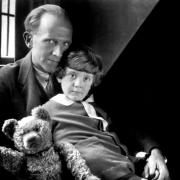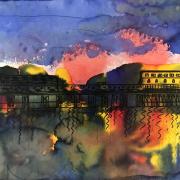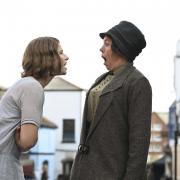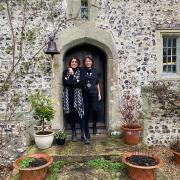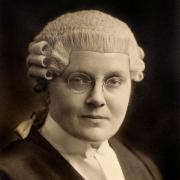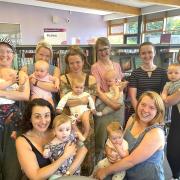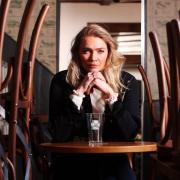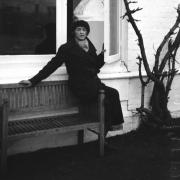Watching her father, the renowned actor Bob Hoskins, lose his memory while battling Parkinson’s drove Rosa Hoskins to write a loving memoir to preserve his memory. She tells Angela Wintle about their close but complex relationship and her idyllic childhood summers in Sussex

The smell of car leather and spearmint always takes Rosa Hoskins back to a happy time before her father was felled by illness. “It was a warm summer’s day and he’d come to pick me up from Lewes Station,” she says. “I got in his car. On the stereo, he was playing a song called Daisy by a folk singer called Karine Polwart. ‘Listen to the lyrics of this, love,’ he said. ‘They’re wonderful. Want a chewing gum? Give us one, will ya?’
“He always had Wrigley’s spearmint gum in the glove compartment of his car,” she smiles. “We drove down the winding country roads, passing the bucolic scenery...” She pauses, lost in reflection. “I often find myself searching for Daisy on Spotify. The spry melody instantly transports me: I’m back travelling through the sunny countryside.”
Rosa’s parents bought their Sussex hideaway, a four-bedroom property with a swimming pool, tennis courts and paddock set in 13 acres just outside Chiddingly, near Lewes, when Rosa was four. “Mum bought it while Dad was away working and instantly fell in love with it,” she says.
“It was a picturesque oasthouse, surrounded by woods, so she put in an offer, which was accepted, even though Dad hadn’t seen it. Then the storm of ’87 happened and the owner rang to say all the trees had been blown down and it was carnage. Thankfully the house had remained unscathed.”
The young Rosa was enchanted by her new rural escape. “The house had low ceilings and beams and an interesting round kitchen where a railway clock chimed the hour. I have lovely memories of Sussex. We visited most weekends and spent as much as six weeks there in the summer.
“As kids, my younger brother Jack and I were always climbing trees, and in the winter we loved jumping in icy puddles in our wellies. We’d go for long walks or take in the dramatic coastal scenery at Beachy Head. Dad loved it because it was so peaceful and quiet – and such a break for him.”
To look at her, you’d never guess that Rosa, 33, was the daughter of the short, stocky actor Bob Hoskins. She is a tall, raven-haired beauty with fine bone structure. It’s no surprise to discover she has worked as a personal stylist and fashion writer. The physical contrast hasn’t been lost on others either – particularly when she went for auditions during an unsuccessful foray into acting. “People expected a small, round girl to show up with a cockney accent,” she laughs. “I’m not what people expect, but anyone who knew Dad well would say I was my father’s daughter.”
Rosa is her father’s third child, but the first from his second marriage to Linda. “When I was young, Dad and I spent a lot of time together so when he went away for work I missed him terribly. There wasn’t any one moment when I thought, wow, my dad’s famous. From the moment I was born I was being taken to film sets all over the world. Visiting the set where Who Framed Roger Rabbit? was filmed in the late 1980s was overwhelming. I remember feeling dwarfed by the cavernous space and filming equipment.
“And when Dad won the part of Smee in Hook in 1991, the whole family moved to LA for three months. We were wide-eyed with delight when we were taken to the Neverland set, which featured a full-scale pirate ship, and we met some Hollywood greats, including Dustin Hoffman, Glenn Close and Robin Williams, who was such a lovely man. At one Sunday get-together he played with Jack and me in the pool for hours.”
She says her father loved his job, but he was so unpretentious that he never saw what he did as a big deal. When his 1986 film Mona Lisa went to Cannes, he didn’t think he had a chance of winning anything so he flew home early. He was pruning roses in the garden when he got the call telling him he had won Best Actor, and to catch a flight back out there.
Perhaps, given his man-of-the-people persona, none of this is surprising, but Rosa says he was a complex man. “People used to pigeonhole Dad and label him ‘hard man Bob Hoskins’, which was partly to do with the class system. He was the tough, working-class lad from Finsbury Park done good. But he was so much more than that. He came from an environment where he’d had to be tough, but he was also very well read, despite the fact he’d left school with one O level.”
Equally, his congenial public persona, which she says was entirely genuine, overshadowed a deeper, more private man. “Dad was a gregarious loner. Left to his own devices he probably wouldn’t have gone out much at all. As I grew older, he became emotionally unavailable and distant. His instinct was to lock himself away in his man cave. At the time I was hurt, but with hindsight it’s clear he needed this quiet time.”
Despite his occasional emotional distances, he and Rosa had a close unspoken bond born out of their similarities. That bond was particularly evident at her wedding in 2010. When her father walked her down the aisle, he looked prouder than she had ever seen him. “It was one of the happiest days of our lives,” she says. “We seemed so innocent, wrapped up in the moment, oblivious to the looming tragedy about to crash down upon us.”
On 28 October 2011, 16 months after her wedding, her dad was diagnosed with an aggressive and degenerative form of Parkinson’s, and told he had only a few years to live. “Our world was shattered. Dad stared down at his feet as we cried. I did my best to be strong, but it was impossible.
“In his final years, I saw him almost every day. As the disease took its toll, I would often sit next to him, place my hand on his and tell him that I loved him. He would raise my hand to his lips for a kiss, then hold it to his cheek and say, ‘I love you, too.’ To mourn someone who is still alive is as perplexing as it is painful. As Dad’s illness tightened its grasp, he became less present and responsive. It felt as though he was drifting away from us. To watch something so insidious fell this great tree trunk of a man was heartbreaking.”
It was then that Rosa decided to write a book about her father. “If you lose your memory, you lose yourself. Part of me wanted to get back some control because when you’re watching someone gradually fall apart, there’s nothing you can do. He was really supportive of my project. It was good for him to use his memory and he enjoyed hanging out with me. We drank tea, ate digestive biscuits and chatted about the past, which I think he rather enjoyed.”
Eventually it became too hard digging into the recesses of his fading mind and she had to abandon their sessions, but just weeks after his death she took up the baton again, asking actors who had worked with her dad, like Ray Winstone and Judi Dench, to share their memories. Pursuing such a project in the rawness of her grief was so hard it nearly brought her to her knees, but people were so sweet and understanding, she says.
Her book is a painful and visceral read at times, unsparing in its forensic account of what it feels like to lose a loved one. “Grief ebbs and flows like the tide,” she writes. “Often it’s a quiet hum in the background, like persistent tinnitus. At other times it can be overwhelming and unbearable. No matter what stage in the tidal cycle, it’s constant. The void that Dad had left behind is merciless and bleak.”
This spring will mark the third anniversary of her father’s death. “I think I’ve accepted it, although sometimes when I visit his grave I think Dad will be there. It’s funny how the brain works,” she says. “What I’ve come to realise is that you don’t get over someone dying; you learn to live with it. The jagged edges of the pain become blunter and you kind of make friends with the loss.”
Her pain is particularly intense just now because she is pregnant with her first child – a boy. “I’m delighted, but Dad not being here is really hard because I know he’d be thrilled. Had he not become ill, I would have had kids sooner, but I needed to progress a little through the grieving process.
“I remember in hospital, when he was only days away from dying and could barely see, he looked at me with such pure love and affection. I’m finally at the stage now where I’m ready to give that to someone else. You’ve got to be grateful for that because yes, it’s painful, but I’m lucky to have had it. Loss is the cost of love. The pain that I feel is a tribute to how close we were and how much he meant to me.”
They sold the family home in Sussex in 2012. “It was tough, but it was the right decision. It’s not that I’m unsentimental. I’m fond of my memories and I’m really happy to revisit them, but I wouldn’t want to go back.”
It’s All Going Wonderfully Well: Growing up with Bob Hoskins by Rosa Hoskins is out now in paperback (Arrow Books, £8.99).
More…
• Derek ‘Nick’ Nicholas on working with Norman Newell, playing to famous guests at the Dorchester Hotel and windmills - As honky tonk pianist Nick, Bexhill’s Derek Nicholas sold more than 500,000 records. Duncan Hall learns about his other on-going obsession




